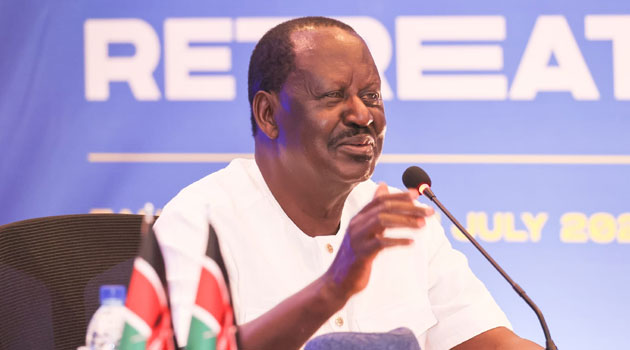
Raila loses AUC seat to Djibouti Foreign Minister after quiting in 6th round » Capital News
NAIROBI, Kenya, Feb 15 — Djibouti’s Mahmoud Ali Youssouf has been elected as the new African Union Commission (AUC) Chairperson after a fiercely contested race that saw him secure the two-thirds threshold with 33 votes in the seventh round of voting.
The race began with Kenya’s Raila Odinga leading the first round with 20 votes, followed closely by Djibouti’s Youssouf, who secured 18 votes.
Madagascar’s Richard Randriamandrato received 10 votes, while one country abstained, leaving no outright winner.
In the second round, Odinga increased his tally to 22 votes, while Youssouf gained momentum, securing 19 votes and surpassing Randriamandrato, who dropped to 7 votes.
By the third round, Youssouf took the lead with 23 votes, while Odinga remained at 20, and Randriamandrato’s support dwindled to 5 votes. One voter abstained.
The fourth round saw Youssouf’s support grow to 25 votes, while Odinga trailed at 21. Two countries abstained, and one vote was spoiled.
In the fifth round, Youssouf gained one more vote, reaching 26, while Odinga remained at 21.
By the sixth round, Youssouf still had 26 votes, while Odinga increased his tally to 22, with one abstention. However, Odinga dropped out, leaving Youssouf as the sole contender.
Youssouf then proceeded to the seventh round, where he secured the two-thirds majority with 33 votes, officially becoming the new AUC chairperson.
2017 setback
Youssouf’s victory marks Kenya’s second unsuccessful attempt to secure the AUC chairmanship, following a similar defeat in 2017 when Moussa Faki of Chad defeated Kenya’s candidate, Amina Mohamed.
In that race, Mohamed advanced through the first three rounds before losing to Faki in the final contest.
Faki won with 38 votes after multiple rounds, surpassing the two-thirds threshold, while the Southern African Development Community (SADC) bloc abstained.
Despite intensive lobbying by Nairobi, Kenya’s bid failed to secure unanimous backing from East African nations.
President William Ruto led an aggressive campaign, traveling across Africa to rally support for Odinga.
Odinga’s team hadclaimed to have secured endorsements from at least 28 nations, but estimates based on Ruto’s diplomatic engagements suggested backing from around 19 countries.
The election outcome highlights the complex geopolitical dynamics within the AU, where regional politics and shifting alliances often determine the final result.
In the 2017 election, Mohamed advanced past the first three rounds, reaching the final contest against Faki.
However, she lost by three votes (28-25) in the decisive round, with one abstention.
In the subsequent seventh vote, Faki secured 38 votes, surpassing the required two-thirds majority, while the SADC bloc abstained.
President William Ruto had crisscrossed the continent to rally support for Kenya’s bid and had dispatched Odinga to personally meet African leaders.